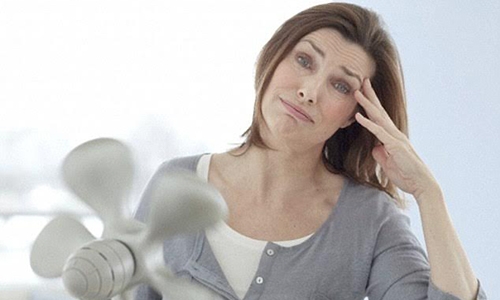Women’s Health In Menopause
When a woman ends the reproductive stage of her life,and stops menstruating, normally between ages 45-55, she enters menopause. At menopause, your body goes through dramatic changes. Ovaries gradually stop producing the hormones estrogen and progesterone that drive the reproductive cycle and help keep your body young. A gradual drop in estrogen levels lead to several common symptoms of menopause: hot flashes, night sweats, mood changes, itchy skin, memory lapses, breast tenderness, menstrual irregularity.
These changes can cause a woman great discomfort and anxiety. Menopause is a natural phenomenon, and should not be feared. It is important for all women to actively adjust to the change in order to live healthy, productive lives far beyond their reproductive years.
Health Issues Related To Menopause
There are special health issues related to menopause that every woman needs to understand and address:
- Dry skin - Lowered estrogen levels can cause skin to dry, lose elasticity, and wrinkle
- Osteoporosis - Bones will tend to deteriorate at a much faster rate, often resulting in osteoporosis
- Swollen joints - Joints will stiffen and cause swelling during periods of inactivity, potentially leading to osteoarthritis
- Cardiovascular problems - Without the protective effect of estrogen, the risk of heart attack increases, eventually equalling that of males of the same age.
- Vasomotor changes - the shift in hormonal balance can cause sensations of hot flashes and dizziness
- Urogenital function - some women lose bladder control or have difficulties in sexual activity due to vulvovaginal changes.
- Psychological effects - some women experience slowing mental function. Anxiety and depression are not uncommon.
If ignored and left untreated, these issues can shorten and dramatically affect your quality of life.
Health Management During And After Menopause
There are steps that can and should be taken to reduce the effects of menopause and to alleviate the associated health risks. It is important to work with your gynaecologist to assess your specific needs and to develop a course of treatment and management.
Hormone Replacement Therapy (HRT)
A simple solution to counter the effects of menopause is to artificially replace the hormones that are lost from the ovaries. Estrogen can be replaced through pills, patches, or creams. HRT is particularly effective in women in the early stages of menopause, from ages 50-60. Risks of heart disease and breast cancer have deterred many women from pursuing this line of therapy, but current research indicates that for women under the age of 60, the health benefits of HRT substantially outweigh the risks.
Natural Pathway for Dealing with Menopausal Health Risks
There are basic steps that every woman should take to adjust to the effects of menopause and to lessen the associated risks to her health. The most important adjustment is to maintain a healthy lifestyle:
Follow a balanced, healthy diet, reducing the amount of sugar, fats, and salt and increasing the intake of lean protein (such as fish and chicken breast),and vegetarians,increasing intake of pulses and soya, and green vegetables.
- Look to include foods that are rich in natural estrogens (phytoestrogens) like soybeans and flax seeds. Phytoestrogens can help replace some of the natural estrogen loss in menopause.
- To counteract bone loss, supplement your diet with daily doses of Calcium and Vitamin D. Ask your gynaecologist if you need to supplement B12 and B6 for improved neurological function.
- Exercise regularly. For cardiovascular fitness you need at least 150 minutes of moderate to vigorous aerobic activity per week. You need to supplement aerobic work with resistance exercises (through weightlifting or elastic bands) at least twice a week to build muscle strength and keep the bones strong.
- If you are overweight, it is important to reduce your calorie intake and to exercise more. This needs to be a permanent lifestyle change, not a temporary adjustment.
- Hydrate regularly, drinking 8 glasses or about 2 liters of water per day and use moisturizing creams to keep skin soft.
- Get more sleep to prevent fatigue and mood swings.
- Layer clothing so you can adjust to sudden temperature sensitivity in your body.
Treating Urogenital Problems
There is no need for women to suffer post-menopausal problems with urinary or genital function. Your gynaecologist can help with specific exercises to strengthen the pelvic area. She can also recommend therapies like estrogen creams and laser treatments so that you can resume normal sexual activity.
Conclusion
As your body changes during menopause, you’ll experience changes both to your health and to your life as you knew it up to this point. Learning how to relieve physical symptoms and finding a sense of balance will help you manage the mental and emotional stresses caused by this transition. Quit smoking, get enough sleep, and make a conscious effort to eat healthily and exercise more to keep symptoms under wraps and to keep you feeling your best.
For more information, contact Dr. Mahnaz Keshavarzian, Consultant Obstetrician Gynaecologist & Laparoscopic Surgeon at Middle East Medical Center, Hidd on 17464848.
Related Posts

